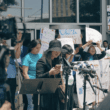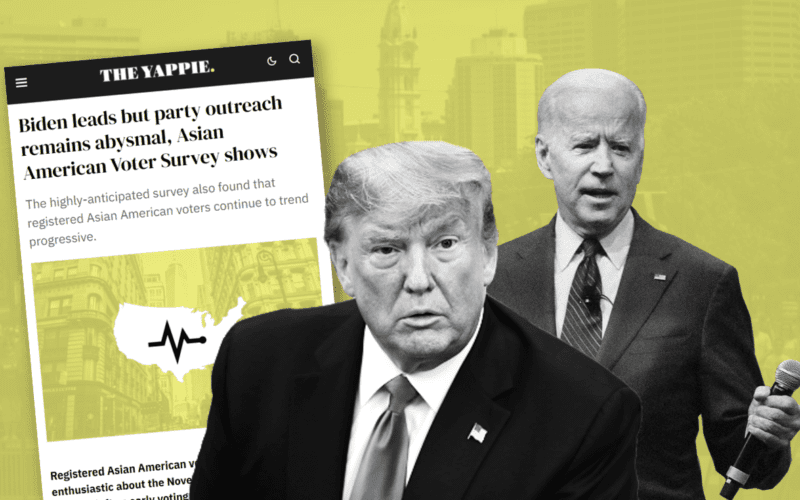Good morning and welcome to The Yappie's Asian American politics and activism briefing. Make sure you subscribe to Steeped in Ambivalence, written by our very own Shawna Chen. Her race and identity-focused newsletter kicked off last week with an analysis of "Mulan" and its disappointing portrayal of Chinese culture. Support our work by making a donation and send tips, events, feedback, and opportunities to [email protected].
The Big Story
RECAP—WHAT WE LEARNED FROM THE 2020 AAVS: New insights from the latest Asian American Voter Survey, which was released on Tuesday by a trio of Asian American Pacific Islander (AAPI) groups, show that Asian Americans are increasingly leaning left despite abysmal outreach from both major parties. Here are some other key takeaways…
- State of the race: Registered Asian American voters now back former vice president Joe Biden (D) by nearly a 2-to-1 margin over President Donald Trump (R). Chinese American voters are the least likely to have a favorable opinion of Trump, though the president has gained support among other groups like Vietnamese and Indian Americans since 2016.
- COVID-19 is on voters’ minds: Most respondents expressed worry about anti-Asian sentiment during the pandemic, said they planned to vote by mail or absentee, and indicated that they were more energized than in previous cycles.
- Priorities: The economy, health care, and education remain top voter concerns, with Republicans slightly favored on the economy and Democrats holding strong advantages on all other issues.
- On the issues: Contrary to familiar narratives about the community, researchers say registered Asian American voters across the board continue to support affirmative action, racial justice, gun control measures, and stronger climate legislation. Read more of our analysis here.
The Trump Era
? BREAKING—WECHAT, TIKTOK BANS SET FOR SUNDAY: WeChat and TikTok will be barred from U.S. app stores starting Sunday night, the Commerce Department said Friday morning, a move that prevents new downloads and updates.
- Context: The news comes just days after the Justice Department said that the Trump administration’s looming ban on WeChat would not prohibit users from using the Chinese-owned app, the Los Angeles Times reports. A group of WeChat users in California is pursuing legal action against the U.S., arguing that the ban targets Chinese Americans and violates users’ rights to free speech, due process, and equal protection under the law.
? UPDATE—APPEALS COURT SCRUTINIZES BIAS CLAIMS AGAINST HARVARD: A panel of federal appeals court judges in Boston appeared skeptical of claims that Harvard University discriminates against Asian American applicants on Wednesday, with oral arguments commencing a high-stakes legal battle that could determine the fate of race-conscious admissions policies.
- Separately… Asian student organizations at Yale are accusing the Trump administration of a “thinly veiled ploy” against affirmative action after the U.S. Department of Justice said the university was illegally discriminating against Asian American applicants last month, the Yale Daily News’ Kelly Wei reports.
- Catch up: New research shows that Asian American students’ experience of college does not necessarily differ depending on admission to their first-choice institution, according to Inside Higher Ed.
?️ 9TH CIRCUIT RULING COULD SIGNAL END OF TPS FIGHT: A federal appeals court sided with the Trump administration in its effort to terminate the Temporary Protected Status (TPS) program on Monday, paving the way for a gradual end to humanitarian protections that allow for roughly 300,000 immigrants to live and work in the U.S. The ruling could have implications for a separate lawsuit on the status of TPS holders from Nepal, the ACLU says, and Reuters reports the Trump administration is also considering postponing or further cutting refugee admissions in the coming year.
AAJC SEEKS ‘TRANSPARENCY’ ON CHINESE VISAS: Asian Americans Advancing Justice—AAJC President and Executive Director John C. Yang is raising fresh concerns around racial profiling after the State Department revealed last week that it revoked more than 1,000 visas of Chinese students and researchers in the U.S. In August, the D.C.-based nonprofit submitted an amicus brief in United States v. Tao in opposition to the Trump administration’s alleged efforts to “profile and target Chinese American scientists and researchers based on ethnicity.”
? DEEP DIVE—ICE CHIEF’S RISE STUNS AAPI ADVOCATES: The U.S. Department of Homeland Security’s selection of Vietnamese refugee Tony Pham as the next acting director of Immigration and Customs Enforcement has sparked an uproar among progressive advocacy groups. Read The Yappie’s profile on Pham here.
On The Hill
? WHAT TO WATCH—Senate Democrats unveiled a $350 million legislative package to counter China’s global influence on Thursday, but it’s unclear whether it has any chance of advancing in the Republican-controlled chamber.
? UPDATE—HOUSE VOTES TO CONDEMN ANTI-ASIAN HATE: A measure sponsored by Rep. Grace Meng (D-New York) condemning “all forms of anti-Asian sentiment as related to COVID-19” cleared the House of Representatives on Thursday despite significant opposition from Republican lawmakers, marking the first time the chamber has addressed the issue during the coronavirus pandemic.
AAPI GROUPS BACK EXTENDED CENSUS TIMELINE: Leading D.C.-based advocacy groups, including SEARAC and OCA-Asian Pacific American Advocates, are throwing their support behind a bipartisan bill that extends 2020 census field operations through the end of October. The legislation was unveiled Tuesday and comes as activists race to ensure an accurate count, which will shape the distribution of federal dollars and political power for the next decade.
- Meanwhile… U.S. District Judge Lucy Koh chastised attorneys for the Trump administration on Monday after they failed to produce documents concerning the U.S. Census Bureau’s plans to cut its head count short by a month.
❤️ SOUTH ASIAN HEART HEALTH BILL ADVANCES: Rep. Pramila Jayapal’s (D-Washington) South Asian Heart Health Awareness and Research Act heads to the House floor for a full vote after clearing the Energy and Commerce Committee earlier this month.
AAPI Nation
?️ NUMBER OF THE WEEK—49.5: That’s the percentage of Asian Americans in Georgia who have requested a mail-in ballot and did not vote at all in 2016.
Here’s what else is happening across America..
- While most registered Asian American voters in California lean towards support for Prop. 15 (property tax restrictions) and 16 (affirmative action), a significant number are still persuadable ahead of the November election, according to new numbers released by AAPI Data.
- Boston City Councilor Michelle Wu (D) formally launched her 2021 mayoral campaign on Tuesday with a video in English, Mandarin, and Spanish.
- Virginia congressional hopeful and Pakistani American lawyer Qasim Rashid (D) won the endorsement of former presidential candidate Andrew Yang on Thursday.
- 150 Pacific Islander and Black expectant mothers in San Francisco will receive a basic income supplement of $1,000 a month during their pregnancy, the SF Chronicle reports.
- Close to 60% of Asian American public school students in NYC have requested remote learning for the upcoming school year, Gothamist’s Elizabeth Kim notes.
- The firearm suicide rate among young AAPIs has risen 179% over the past decade, according to a new analysis of CDC data by Everytown for Gun Safety.
- The New York Police Department made its newly-formed Asian hate crime task force permanent on Wednesday, though NBC News’ Kimmy Yam reports that some community groups are worried about unintended consequences.
- Decades of colonialism, nuclear testing, and other factors have made Arkansas’ Marshallese community especially vulnerable to the coronavirus.
- Nevada’s growing AAPI vote will be “key to ensuring Democratic victories,” labor union representatives say in a new Asian Journal op-ed.
- Liberal philanthropist Susan Sandler is expected to give $200 million to racial justice groups, including the AAPI Civic Engagement Fund, The New York Times reports.
- A contact tracer in Sacramento is filling a much-needed gap by using a statewide database to track down COVID-positive residents who list Hmong as their first language, the Sacramento Bee’s Ashley Wong writes.
? Enjoying The Yappie? Make a donation, forward this briefing to a friend, or subscribe here. You can also follow us on Twitter, Instagram, and Facebook.









